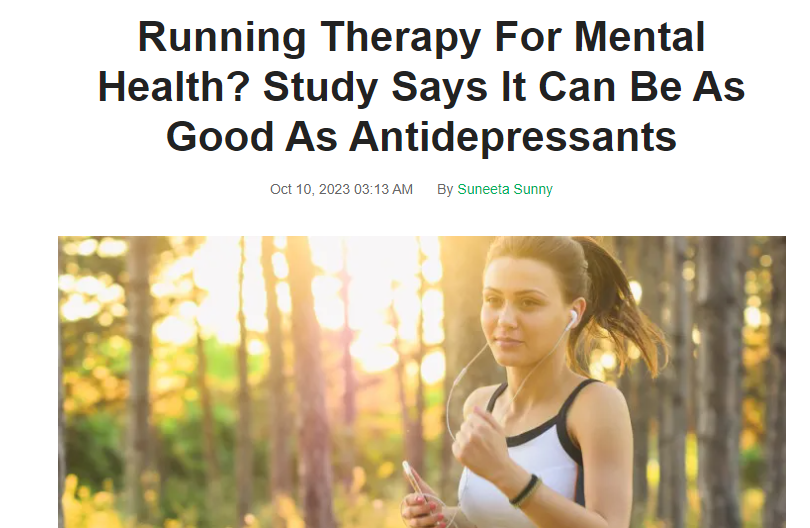Another new ivermectin study out recently. Apparently it is quasi-randomized and proof that suppressing ivermectin is a "crime against humanity"
Let's do some twitter peer-review 1/n
Let's do some twitter peer-review 1/n
https://twitter.com/Covid19Crusher/status/1469745629631033348
2/n The preprint is here, and it's a retrospective analysis of routinely collected clinical registry data from the city of Itajai in Brazil
researchgate.net/publication/35…
researchgate.net/publication/35…
3/n The design was very simple - take routine data on people who either had or had not elected to be part of an ivermectin distribution program, and controlled for a small number of confounding variables using either a propensity-score or regression model 



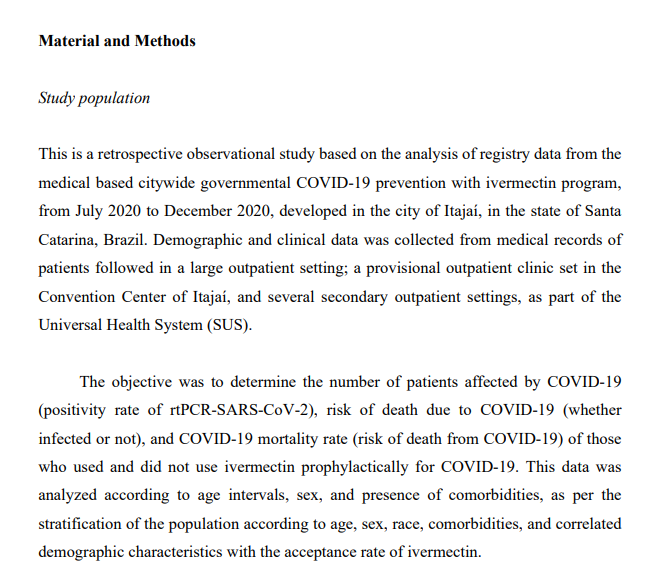

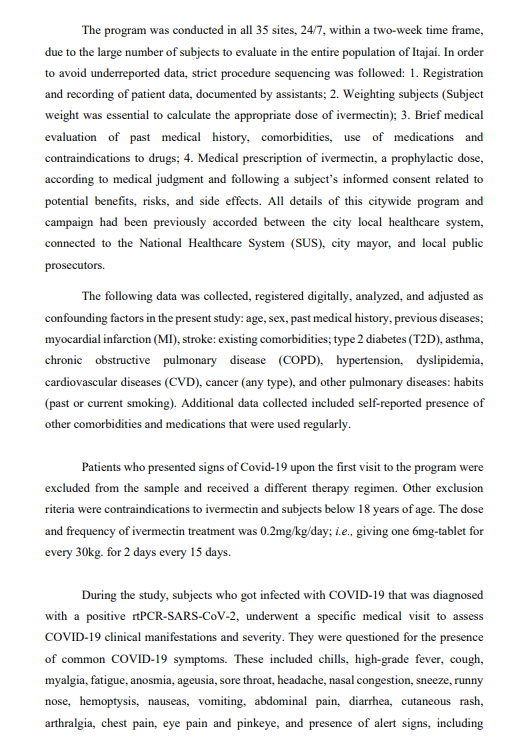
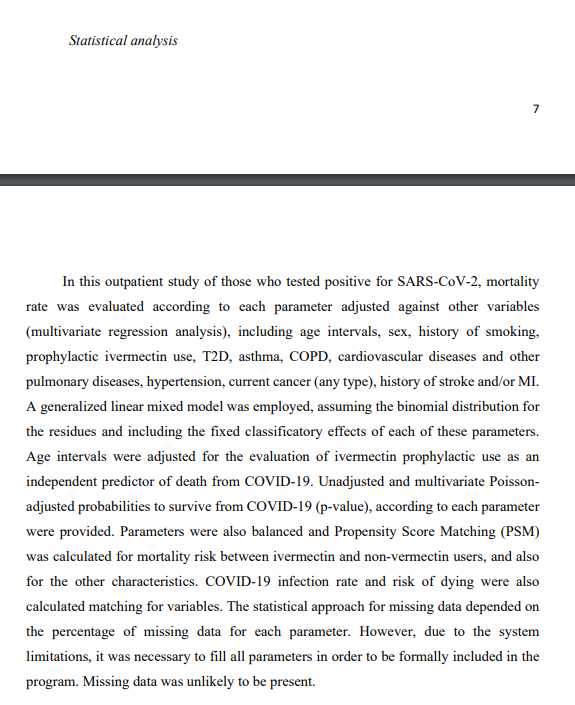
4/n They authors found a very modest benefit for ivermectin on the risk of having a recorded infection, but a very large relative benefit for mortality from COVID-19 

5/n So, on to the problems. There are quite a few.
Firstly, the author group. While this is not disclosed in the paper, several authors are members of the FLCCC, an ivermectin promotion organisation who we might expect to have some interest in the outcome of the research
Firstly, the author group. While this is not disclosed in the paper, several authors are members of the FLCCC, an ivermectin promotion organisation who we might expect to have some interest in the outcome of the research
6/n The corresponding author, Dr. Cadegiani, has been accused of, and I kid you not, "crimes against humanity" due to ethics breaches in his previous research on COVID-19 bmj.com/content/375/bm…
7/n On top of this, two of the authors report a direct financial conflict of interest, in that they say they work for a pharmaceutical company that makes money off ivermectin 
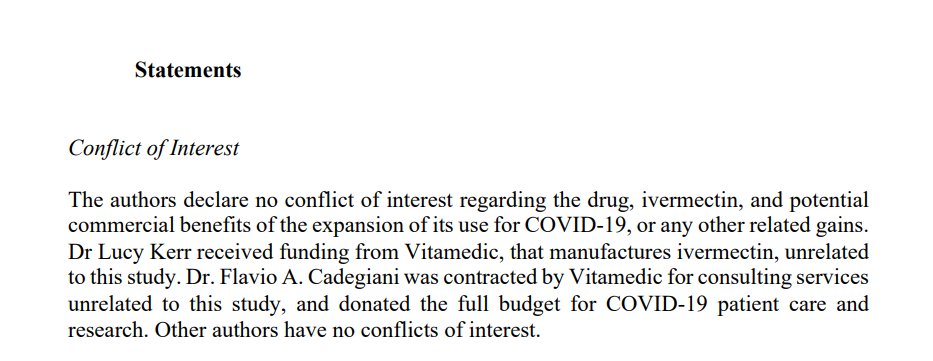
8/n So, on to the study itself. In general, it's a fairly simple example of observational research that you'd do on routine medical data. The authors took an intervention (primary care doctor giving ivermectin), divided people into 2 groups based on this, and compared them
9/n The controls for confounding are obviously pretty inadequate given the purpose. The paper aims to see whether ivermectin has an impact on COVID-19 risk, but they don't control for any confounders that might increase your risk of catching COVID
10/n For example, there's no control for occupation, nothing about income, no analysis of the results looking at many well-known risk factors for COVID-19 infection and death
11/n To their credit, the authors do control for some major comorbidities, but since these are rarely related to the risk of CATCHING the disease (as opposed to dying from it if you get it), the causal chain is quite messy 

12/n So the potential for uncontrolled confounding is high, and this cannot possibly be described as "quasi-randomized". Quasi-randomized studies are usually either natural experiments with some randomness to them, or prospective studies where randomization was done poorly
13/n Moreover, there are some pretty obvious challenges with ascertaining causality here. The intervention was a doctor prescribing ivermectin at some point, but as far as I can tell that's not followed up on at all in the paper
14/n We do not know, for example, how many in either group were taking ivermectin BEFORE the study took place (given the heavy use of the drug in Brazil, it is likely to be a non-zero figure)
15/n There's also quite strong evidence that many of the "ivermectin" group did not pick up the medication, and stopped taking it almost immediately
https://twitter.com/sean_purdy/status/1470410070819319809?s=20
16/n This means that there may have been a large proportion of people in the control group taking ivermectin, and a similar proportion in the intervention group NOT taking ivermectin. There's no analysis of this issue in the paper that I can see
17/n There are other issues with the document, although to be fair here it's only a preprint so you expect some mistakes. For example, the main result presented is the unadjusted risk ratio, but for the adjustments the authors just give a p-value 

18/n But overall, it's just not a very convincing paper. There is a huge potential for uncontrolled confounding, there are issues with the delineation of intervention vs control groups, and it's generally just a very weak observational study
19/ All of this makes the "limitations" and conclusions sections absolutely bizarre. Turns out you can just declare things are causal as long as you believe it hard enough I suppose? 

20/n Ultimately, this newest piece of research is a very weak paper. It might be useful as the very first piece of research into a medication, but it gives us no useful information at this point in the ivermectin literature
21/n It's also worth noting that the people who've been complaining about low ivermectin doses, people not taking drugs etc in NEGATIVE trials are very happy to ignore these issues when it comes to a POSITIVE result
I wonder why that is 🤔🤔🤔
I wonder why that is 🤔🤔🤔
22/n Turns out there are even more issues with the study. Very worrying stuff
https://twitter.com/K_Sheldrick/status/1478883720497020928?t=UDu7-Z5mU4nPVy9ux3HC8Q&s=19
23/n In an rather astonishing move, the paper is now only available from the preprint server "on request", after being promoted heavily for weeks by the authors after numeric errors were discovered 

24/n I spoke too soon! The paper is up, with more concerning issues yet again
https://twitter.com/K_Sheldrick/status/1480670214224166913?s=20
• • •
Missing some Tweet in this thread? You can try to
force a refresh







